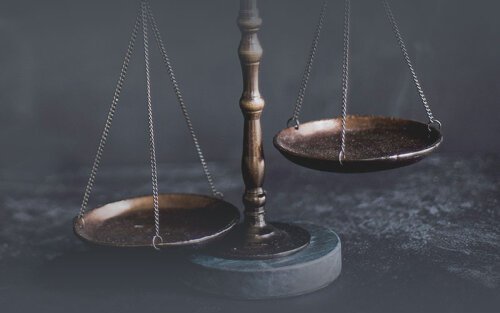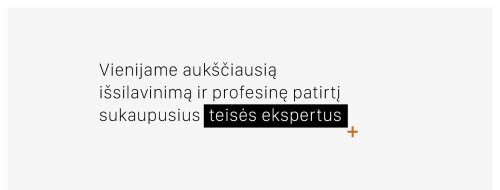Best Creditor Lawyers in Kaunas
Share your needs with us, get contacted by law firms.
Free. Takes 2 min.
List of the best lawyers in Kaunas, Republic of Lithuania
About Creditor Law in Kaunas, Republic of Lithuania
Creditor law in Kaunas, Republic of Lithuania refers to the body of legal rules that define the rights and obligations between creditors and debtors. This area of law encompasses all aspects of debt recovery, credit agreements, insolvency proceedings, and enforcement actions when a debtor fails to meet their financial obligations. As Lithuania is part of the European Union, its legislation must also align with applicable EU directives and regulations but is primarily governed by national laws such as the Civil Code of the Republic of Lithuania. Kaunas, as the second-largest city in Lithuania, is a major economic hub where creditor law is routinely applicable to both individuals and businesses.
Why You May Need a Lawyer
Engaging a lawyer when dealing with creditor-related matters in Kaunas can be crucial for several reasons:
- If you are a business or individual seeking to recover debts and require professional assistance with debt collection processes.
- If you are facing a contractual dispute concerning unpaid loans, invoices, or other obligations.
- To ensure compliance with strict procedural laws regarding claims, enforcement, and insolvency proceedings.
- When negotiating settlements or restructuring debts with debtors in order to maximize recovery and minimize losses.
- If you need to challenge or defend against enforcement actions such as asset seizures or court orders.
- For representation in court or in alternative dispute resolution forums in debt-related disputes.
Local Laws Overview
Several key legislative frameworks govern creditor law in Kaunas and throughout Lithuania:
- Civil Code of the Republic of Lithuania: This is the main law governing contracts, obligations, debt recovery, and creditor rights. It sets out the processes for enforcing claims and obligations between private parties.
- Laws on Bankruptcy and Restructuring: These govern company and personal insolvency, specifying the order of creditor claims during insolvency and the rights of secured versus unsecured creditors.
- Code of Civil Procedure: This outlines the rules for bringing claims, obtaining judgments, and enforcing court decisions.
- Laws on Enforcement Proceedings: The rules for bailiffs and enforcement agents when recovering debts, including asset seizure, auction, and garnishments.
- Consumer Protection: Laws protect individual borrowers from unfair practices by creditors, ensuring transparency and fair treatment.
Frequently Asked Questions
What is a creditor under Lithuanian law?
A creditor is any natural or legal person who has the right to demand the fulfillment of a financial or contractual obligation from another party, known as the debtor.
How can I recover a debt in Kaunas?
Debt recovery typically begins with written demands. If the debtor fails to pay, you may file a civil claim with the local court. After receiving a judgment, you can seek enforcement through a bailiff.
How long do I have to make a claim against a debtor?
Limitation periods apply depending on the nature of the claim. For most contractual debts, the general limitation is three years, but specific circumstances may affect this term.
What happens if my debtor declares bankruptcy?
If a debtor is declared bankrupt, creditors must register their claims with the insolvency administrator. The law sets a strict order of priority for distributing assets among creditors.
Can I charge interest on unpaid debts?
Yes, Lithuanian law allows the creditor to claim statutory or contractually agreed interest on overdue amounts. The rate and calculation method should be in the contract or determined by law.
What actions can a bailiff take to enforce a debt?
Bailiffs can seize the debtor’s assets, freeze bank accounts, garnish wages, and arrange public auctions to satisfy the debt under a court order.
Are there any special protections for consumers?
Yes, consumers enjoy certain protections against unfair contractual terms, aggressive debt collection practices, and have the right to transparent information about credits and obligations.
Can I negotiate a settlement with my debtor?
Creditors and debtors are encouraged to negotiate settlements either directly or through mediation. Any agreement reached should be documented in writing and signed by both parties.
What documents should I keep as a creditor?
Maintain original contracts, invoices, payment records, written communications, and any documents that evidence the debt and the efforts made to collect it.
Do I need a lawyer for small claims?
While not mandatory, legal advice can help ensure your claim is appropriately filed and represented, which can increase your chances of successful recovery, especially if the case becomes contested.
Additional Resources
For further assistance or authoritative advice concerning creditor matters in Kaunas, consider the following resources:
- Lithuanian Chamber of Bailiffs: Supervises bailiffs and provides information on enforcement procedures.
- Kaunas Regional Court: Handles creditor and debtor disputes and provides information about filing claims.
- State Consumer Rights Protection Authority: Offers guidance and regulation on consumer-creditor relations.
- Lithuanian Bar Association: A directory of licensed legal professionals specializing in creditor law and related disputes.
- Enterprise Bankruptcy Service under the Ministry of Economy: Provides oversight and regulation of bankruptcy and restructuring procedures nationwide.
Next Steps
If you believe you need legal assistance as a creditor in Kaunas, begin by gathering all relevant documentation including contracts, invoices, payment records, and correspondence with the debtor. Consider consulting a qualified lawyer who can assess your situation, explain your legal options, and guide you through the necessary procedures. Initial consultations can often clarify whether informal settlement, litigation, or enforcement actions are most suitable for your needs. Finally, act as early as possible to ensure your claim is not at risk of becoming time-barred and that you can pursue your rights fully under Lithuanian law.
Lawzana helps you find the best lawyers and law firms in Kaunas through a curated and pre-screened list of qualified legal professionals. Our platform offers rankings and detailed profiles of attorneys and law firms, allowing you to compare based on practice areas, including Creditor, experience, and client feedback.
Each profile includes a description of the firm's areas of practice, client reviews, team members and partners, year of establishment, spoken languages, office locations, contact information, social media presence, and any published articles or resources. Most firms on our platform speak English and are experienced in both local and international legal matters.
Get a quote from top-rated law firms in Kaunas, Republic of Lithuania — quickly, securely, and without unnecessary hassle.
Disclaimer:
The information provided on this page is for general informational purposes only and does not constitute legal advice. While we strive to ensure the accuracy and relevance of the content, legal information may change over time, and interpretations of the law can vary. You should always consult with a qualified legal professional for advice specific to your situation.
We disclaim all liability for actions taken or not taken based on the content of this page. If you believe any information is incorrect or outdated, please contact us, and we will review and update it where appropriate.
















